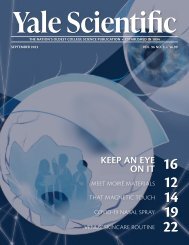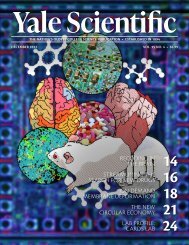YSM Issue 90.1
Create successful ePaper yourself
Turn your PDF publications into a flip-book with our unique Google optimized e-Paper software.
in brief<br />
NEWS<br />
The Miller laboratory of Yale’s Department<br />
of Chemistry recently made a discovery<br />
in peptide catalysis that could change how<br />
we think about enzymes. This discovery<br />
capitalized on the laboratory’s previous<br />
discovery of two peptide catalysts. Enzymes,<br />
or protein catalysts, are characterized by high<br />
specificity. Alford, the study’s first author, and<br />
his colleagues demonstrated that two short<br />
peptides, which are comprised of protein<br />
building block called amino acids, can catalyze<br />
two distinct, complementary reactions called<br />
oxidation reactions. This remarkable capacity<br />
is presumably due to the synthetic peptide’s<br />
overall structure: by varying just a few key<br />
amino acids outside of the active site where the<br />
reaction takes place, the same active residue can<br />
switch between catalyzing two very different<br />
reactions. This control of catalytic activity by<br />
Shrinking Enzymes<br />
By Giorgio Caturegli<br />
modifying secondary structure is a hallmark<br />
of enzymes but has had limited application<br />
in organic synthesis. “This finding is a really<br />
interesting manifestation of what the [Miller]<br />
group tries to do…using tools that nature has<br />
to understand natural processes,” said Nadia<br />
Abascal, a coauthor. Synthetic reactions can<br />
be studied to gain insight into processes in<br />
nature, which may follow a similar mechanism<br />
to the reactions observed in this study.<br />
Especially notable is the fact that peptides<br />
are orders of magnitude smaller than<br />
enzymes, and their small size and precise<br />
control could allow for synthetic applications<br />
in pharmaceutical and materials research.<br />
The Miller group’s recent finding in peptide<br />
catalysis is important to both understanding<br />
natural biochemical processes and developing<br />
synthetic applications.<br />
PHOTOGRAPHY BY NATALIA ZALIZNYAK<br />
►Miller’s laboratory discovered two<br />
peptides that can catalyze two different<br />
reactions based on secondary<br />
structure and reaction conditions.<br />
A New Excuse for Playing Video Games?<br />
By Jasper Feinberg<br />
Imagine if video games were a key to<br />
improving learning. Yale psychiatry professor<br />
Bruce Wexler believes they are. A study found<br />
that a video game-based learning regimen<br />
called Activate, developed by Wexler, improved<br />
the test performance of 583 schoolchildren<br />
compared to those without the regimen and<br />
those with one-on-one tutoring. The curriculum<br />
includes computer games aimed at cognitive<br />
improvement and a five minute warm-up<br />
computer activity designed to prepare students<br />
for learning.<br />
The Activate program harnesses<br />
neuroplasticity. The structure of the brain<br />
is shaped after birth from environmental<br />
stimuli that reorganize neuronal connections.<br />
Activate stimulates areas of the brain often<br />
underdeveloped in children who grow up in<br />
poverty or have neurodevelopmental problems<br />
like attention deficit hyperactivity disorder<br />
(ADHD). To accomplish this, Wexler used<br />
neuroimaging studies to identify the regions<br />
of the brain corresponding to certain cognitive<br />
tasks. Wexler describes Activate as “a school<br />
lunch program for the brain” customized to each<br />
individual student.<br />
The social implications of this educational<br />
strategy are vast. First, Activate has the potential<br />
to close the achievement gap by helping students<br />
with different educational backgrounds. As a<br />
technology-based tool, it is cheaper than many<br />
current solutions. Wexler’s research is also an<br />
effective treatment for depression and, in some<br />
cases, ADHD.<br />
Going forward, C8 Sciences, a Yale startup<br />
dedicated to spreading Activate, hopes to<br />
increase awareness and continue improving<br />
the program. Activate has been translated into<br />
multiple languages, and appears primed to<br />
expand.<br />
IMAGE COURTESY OF BRUCE WEXLER<br />
►A student using Activate, a gamebased<br />
learning program shown to<br />
improve test performance, in her<br />
school’s computer lab.<br />
www.yalescientific.org<br />
December 2016<br />
Yale Scientific Magazine<br />
7


















